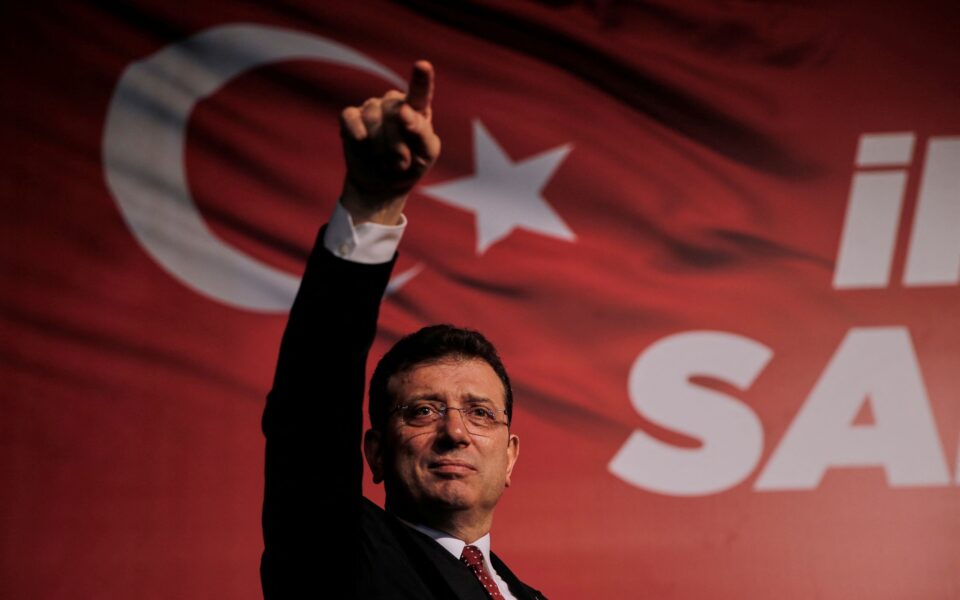Α court decision that will backfire on Erdogan

Strongmen, it seems, never learn from the mistakes of others and, worse, do not even remember their own blunders. Istanbul’s mayor, Ekrem Imamoglu, was convicted to more than two years in jail and will be banned from all political activity. The reason is simple: Turkey’s mercurial president, Recep Tayyip Erdogan, who faces a do-or-die election in 2023 needed to thwart a potential presidential bid by Imamoglu. Erdogan fears Istanbul’s mayor way more than the opposition coalition’s putative leader, a colorless and unimaginative former bureaucrat, Kemal Kilicdaroglu.
This court decision will come back to haunt Erdogan; it will not only make Imamoglu the real contender but will further weaken him in the eyes of the electorate as it demonstrates the president’s own insecurity. Fatigue with his 20-year presidency and inordinately high inflation has been eating away at his support. The irony is that modern Turkish history is replete with political interventions, direct or indirect, that produced the exact opposite of the intended result. Erdogan himself owes his meteoric rise to a similar shortsighted behind-the-scenes 1999 diktat by military officers and the secular elite. He too was then the mayor of Istanbul and was sentenced to jail for reading a poem. The backlash against his conviction and ban from politics eventually catapulted him to becoming Turkey’s prime minister.
Moreover, Erdogan should remember that in 2019 he single-handedly forced a rerun of the Istanbul mayoral election because his own party’s candidate had lost to Imamoglu by a sliver (0.16 percent). In the forced rerun of the elections a few months later, Erdogan’s intervention backfired, resulting in a humiliating defeat by more than 9 percent. These are not the only examples: In 1983 the head of the ruling military junta warned voters against voting for Turgut Ozal as president, and yet they “disobeyed” the officers. In 2007, the military establishment tried to block Erdogan’s pick, Abdullah Gul, from becoming Turkey’s president because his wife wore a headscarf. Erdogan, shrewdly seizing the moment, called for new parliamentary elections, which validated him and dealt the generals a mortal political blow.
With all this recent history, why would Erdogan risk a repeat experience? The answer is probably quite simple: Because he can. He has molded almost all Turkish institutions in his own image, denuding them of their independence and autonomy, and surrounded himself with subservient aides who never challenge his wisdom. The Turkish justice system has been weaponized to pursue and punish Erdogan’s real and imaginary opponents, ranging from politicians to civil society leaders, journalists and academics. It is not unlike Putin’s Russia. To use former New York judge Sol Wachtler’s maxim, if Erdogan desires it, the system would “indict a ham sandwich.”
To use former New York judge Sol Wachtler’s maxim, if Erdogan desires it, the system would ‘indict a ham sandwich’
Judges and prosecutors, almost all of whom have been appointed by him, know that if they dare cross him, they will end up becoming a victim as well. Hence, the jails are full of people who have been charged with absurd “crimes” and worse indictments filled to the brim with bizarre charges. In this case, Imamoglu was convicted of insulting a ruling party member and interior minister, Suleyman Soylu, for calling him a fool. Imamoglu argued that he was only responding to Soylu, who first had called him “a fool.” Yet, the Turkish justice system twisted itself into knots to charge him for insulting the Electoral Council. Just for that one word, he received a sentence of two years, seven months, and 15 days.
Erdogan, who has also introduced draconian rules designed to punish those who spread “disinformation,” thinks he will be able to control the public’s displeasure. Istanbul is not just Turkey’s largest metropolis, but it is also an amalgamation of people from every corner of the country, with their intense web of connections. Hence, word will spread. Already demonstrators in Istanbul objecting to the verdict and calling for Erdogan’s resignation are also shouting “Rights, law, justice,” slogans emulating those of Iranian protesters, “Women, life, freedom.”
These developments will certainly erode Erdogan’s hold and elevate Imamoglu’s visibility, propelling him to become the main contender in the upcoming elections. One benefit that may also arise from these developments is that it will get the public to focus on the numerous dissidents wasting away in prisons following shameful trials consisting of manufactured evidence. For incarcerated people like Osman Kavala, a civil society leader, and Selahattin Demirtas, the former leader of the pro-Kurdish party, along with countless other victims of Erdogan’s whims, Imamoglu’s conviction may help turn the tide.
However, an Erdogan whose support is declining is likely to become ever more aggressive and risk-taking with his foreign policy. He will want to appeal to nationalist sentiments by intervening in northern Syria and/or raising tensions with Greece and Cyprus, risking a serious crisis with Washington. His calculation would be that he will always be able to attend to these tensions after a re-election victory. But we also know that it is not always that simple and that incidents may get out of hand.
Henri J. Barkey is the Cohen Professor of International Relations at Lehigh University in Bethlehem, Pennsylvania, and an adjunct senior fellow for Middle East studies at the Council of Foreign Relations.





